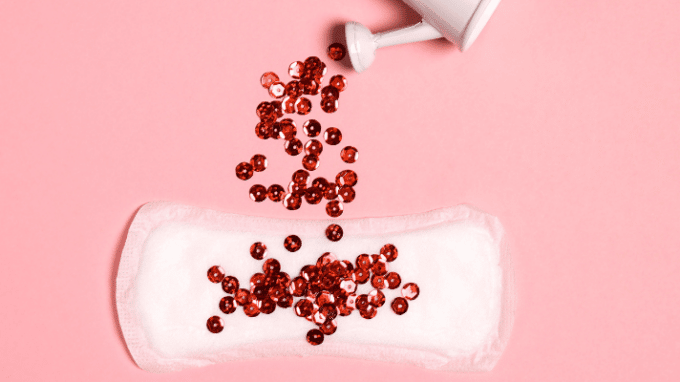It is normal for blood flow during a period to vary from woman to woman. Some women may experience minimal blood flow and a little cramping, while others have a larger amount of blood flow along with more severe cramps. Aside from being uncomfortable and inconvenient, heavy periods, or menorrhagia, can contribute to a variety of health issues – including infertility — if left untreated.
What are Heavy Periods?
Upon the onset of menstruation, before the period-regulating hormones have kicked in, irregular periods are common, and some periods may seem heavier than others. Although heavy periods are most common between the ages of 16 and 30, they can happen at any age. For most women, heavy periods usually do not occur on a regular basis, but rather only periodically or once or twice throughout the year.
Although most women experience heavier-than-normal menstrual bleeding from time to time, typically it is not severe enough to be considered menorrhagia, which affects only about one in every 20 women. With menorrhagia, a woman has heavy flow (more than 80 mL of blood loss) over the course of seven days or more. A woman experiencing menorrhagia may have difficulty performing regular, everyday activities, or feel tired, weak, dizzy or short of breath.
What Are the Signs?
Although heavier-than-normal periods may occur from time to time, it is a good idea to consult your health care practitioner if you regularly experience any of the following symptoms.
- You must wear two sanitary napkins at the same time.
- You typically leak through your clothes, even when wearing a tampon.
- You find yourself changing your tampon or sanitary napkin every hour or two.
- You notice a lot of blood clots along with dark red and heavy flow.
- Your period lasts for more than seven days.
What Causes Heavy Periods?
There are many possible causes of heavy periods, including hormonal fluctuations or imbalance, uterine fibroids or other uterine abnormalities, polycystic ovary syndrome (PCOS), endometriosis and blood clotting disorders. Following is a deeper look into just a few of the common causes of heavy periods.
Some women experience heavy periods as a side effect of being on birth control pills. Birth control pills can alter the levels of progesterone and estrogen in your body so that your period may get heavier or last longer for seemingly no reason.
For help with Birth Control Recovery and Balancing Hormones for Conception, click here.
Endometriosis is a condition where the endometrial cells that are normally found inside the uterus grow outside of your uterus. Endometriosis usually affects organs in the pelvic region, such as the ovaries and fallopian tubes and the tissue lining the pelvis.
Endometrial cells residing outside of the uterus behave as regular endometrial cells do, breaking down and bleeding during the menstrual cycle – however because there is no place for these cells to go, they may form cysts or bands of fibrous tissue that can cause pelvic pain. Endometriosis has also been known to cause heavy periods and bleeding in between periods.
An imbalance of levels of estrogen, progesterone or testosterone can cause an increase in the lining that builds up inside the uterus each month, resulting in heavier-than-normal blood flow during your period. It is also possible that a failure to ovulate in any given month can cause your period to be heavier due to the hormonal imbalance this can cause.
Heavy bleeding during your period could be a sign of Polycystic Ovary Syndrome. This condition occurs when the ovaries do not release an egg each month, causing small cysts to form on the ovaries. A common symptom of PCOS is heavy or irregular periods.
Congenital blood clotting disorders can cause heavy periods, due to an inability of the blood to clot properly.
Heavy periods are often a common symptom of uterine fibroids. Uterine fibroids are noncancerous growths that grow in or around the uterus, and are very common, with up to 80 percent of all women developing fibroids by age 50. Uterine fibroids encourage the growth of blood vessels, influence hormone levels and can affect the uterus’s ability to contract, all of which can contribute to heavy periods.
Can Heavy Periods Affect Fertility?
Because a heavy period can be a sign of hormonal imbalance, uterine fibroids, endometriosis or another issue that could affect fertility and the ability to maintain a healthy pregnancy, in some cases, heavy periods might make it difficult for women to become pregnant or maintain a pregnancy. However, the amount of blood flow during a woman’s period alone will not affect her ability to get pregnant.
If you think that your periods are unusually heavy, consult with your doctor to rule out possible causes of heavy blood flow that might interfere with fertility or the ability to carry a baby to term.
Treatment Options
If you are experiencing heavy periods, there are several treatment options that might work for you, depending on the cause. Here are just a few that might help.
In some cases, simple dietary changes can help to manage the symptoms of heavy menstrual flow. A diet rich in iron can help alleviate certain symptoms associated with heavy periods by promoting the formation of red blood cells and protecting against anemia. Staying hydrated and eating a low-sugar diet can help to promote hormone balance to protect against the possibility of heavy periods.
Using over-the-counter pain relief medications like ibuprofen or naproxen sodium can help relieve menstrual cramps, so you will not have to experience severe pain during your period. Other medications can be prescribed by your doctor to help regulate blood flow and ease the discomfort of heavy periods.
Birth control pills can help regulate hormones and prevent heavy periods, depending on the type of pill you are taking. This is because they can help to regulate menstrual flow while also thinning the endometrial lining, leading to shorter periods and reduced menstrual flow.
Hormone therapy most often involves the use of progesterone or estrogen, and is usually prescribed to treat endometriosis or polycystic ovary syndrome. Hormone therapy can be taken in the form of tablets by mouth, as a skin patch or as injections. Hormone therapy helps to normalize hormone levels so that you have fewer heavy periods.
Heavy periods can be uncomfortable but do not have to be unbearable or lead to further health concerns. For that reason, you should try to do what you can to prevent or treat them before they become too troublesome.
This includes consulting with your doctor to rule out any underlying health issues that may be contributing to heavy periods. He or she can also help you to determine whether there is a medication that might work for you, as well as ways to manage the pain and discomfort that can come with having a heavy period.





